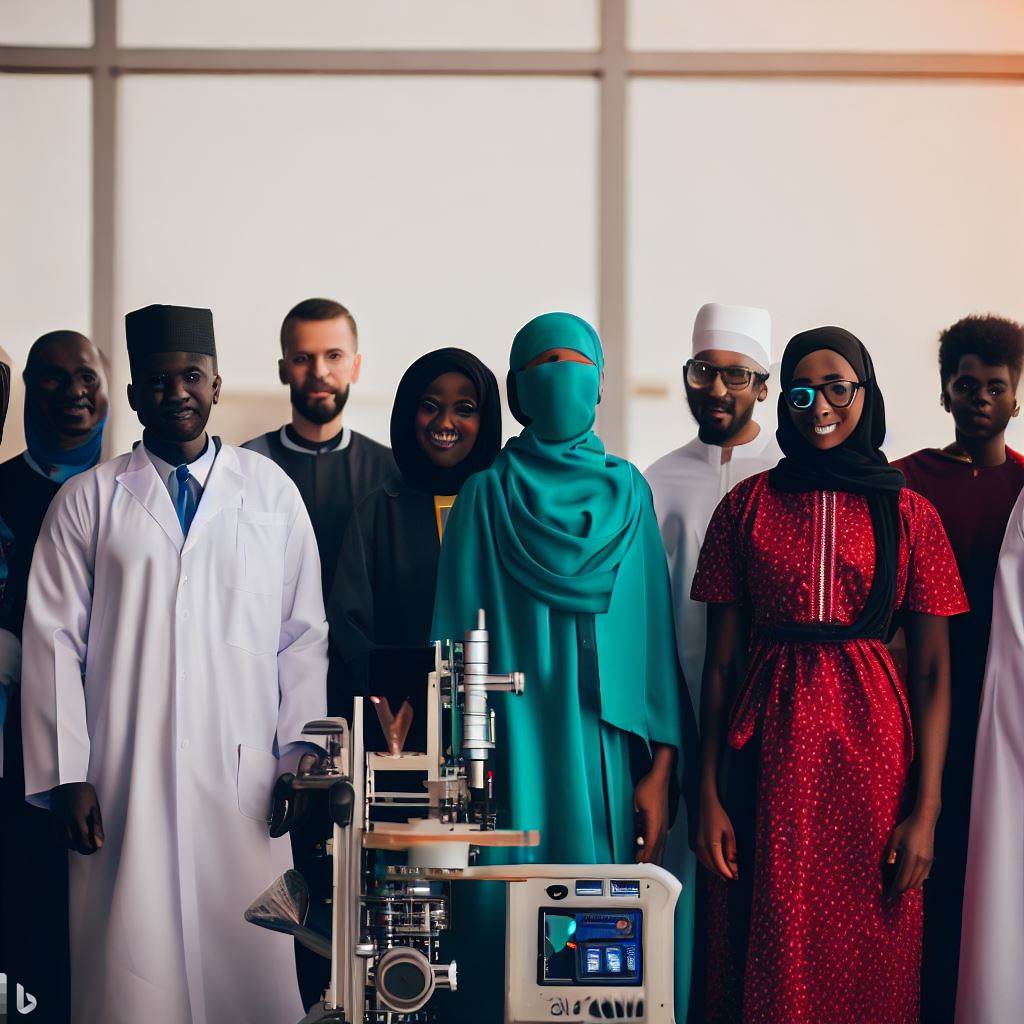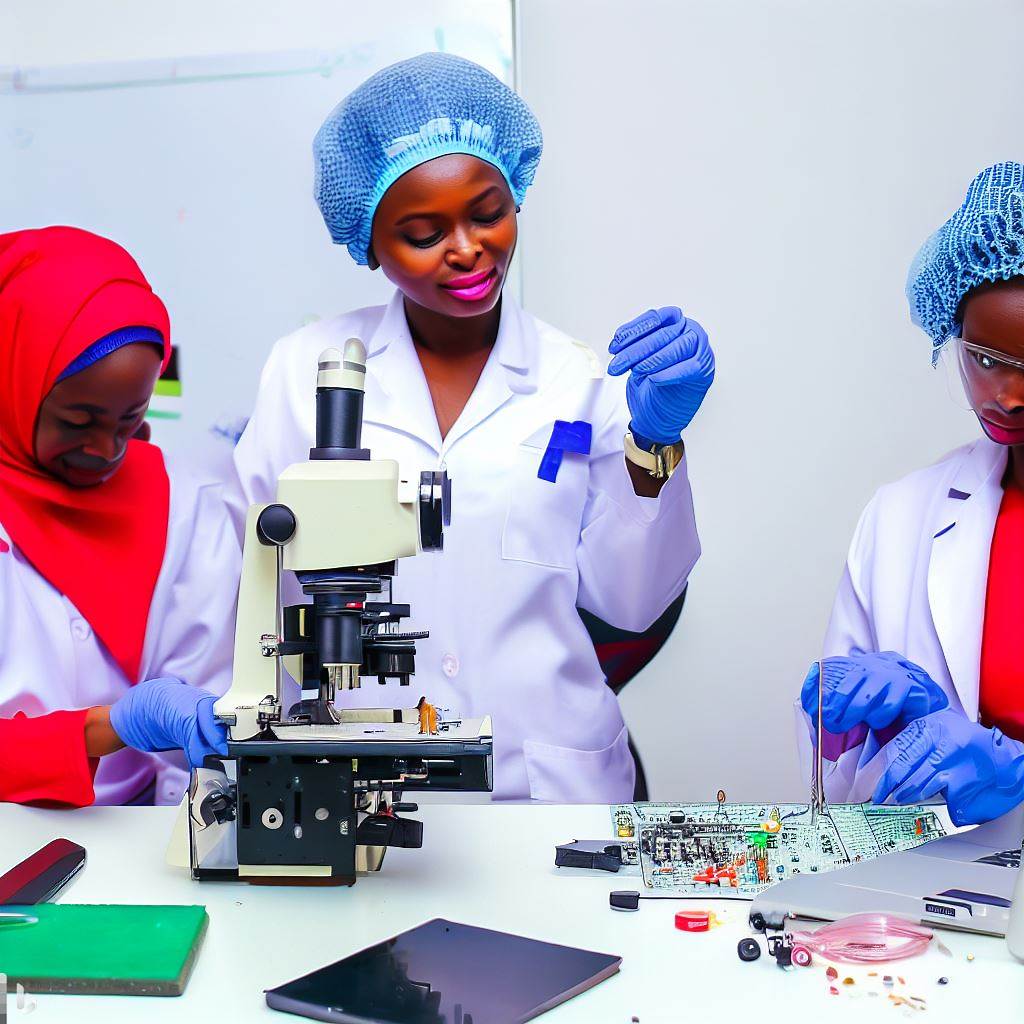Introduction
Nigeria, with its population of over 200 million people and diverse ethnic groups, has a unique perspective on diversity in biomedical engineering.
Biomedical engineering is the application of engineering principles and methods to healthcare and medicine.
It combines knowledge from various disciplines such as biology, medicine, and engineering to develop innovative solutions for healthcare challenges.
Diversity is paramount in the field of biomedical engineering. It allows for a variety of perspectives, experiences, and backgrounds to come together and collaborate.
This diversity leads to the development of new ideas and approaches to improve healthcare outcomes and patient care.
Nigeria recognizes the significance of diversity in biomedical engineering.
With its multicultural society, Nigeria understands that embracing diversity allows for a wider range of solutions to healthcare problems.
By incorporating different perspectives, Nigeria aims to address the unique healthcare challenges faced by its diverse population.
Additionally, diversity in biomedical engineering promotes inclusivity and equal opportunities, ensuring that all voices are heard and represented.
It encourages the involvement of individuals from different genders, ethnicities, and backgrounds, fostering a more comprehensive and holistic approach to healthcare.
Diversity is crucial in biomedical engineering, and Nigeria recognizes its importance.
By embracing diversity, Nigeria can tap into the vast potential of its diverse population to address healthcare challenges effectively and develop innovative solutions for better patient care.
Background on Biomedical Engineering in Nigeria
Growth and development of biomedical engineering in Nigeria
- Nigeria has seen significant growth and development in the field of biomedical engineering.
- The field has evolved to address healthcare challenges and meet the needs of the population.
- There has been an increase in the number of universities offering biomedical engineering programs.
- Research and development activities have contributed to the advancement of the field in Nigeria.
Key institutions and organizations involved in promoting diversity
- The Nigerian Society of Engineers (NSE) plays a critical role in promoting diversity in biomedical engineering.
- The NSE organizes conferences, seminars, and workshops to enhance diversity in the field.
- Universities and research institutions collaborate with international partners to promote diversity.
- Government agencies provide funding and support for initiatives that promote diversity.
Challenges faced in achieving diversity in the field
- Gender inequality remains a significant challenge in the field of biomedical engineering in Nigeria.
- Fewer women pursue careers in biomedical engineering compared to men.
- There is a lack of awareness about the opportunities and potential of biomedical engineering among students.
- Insufficient funding hinders the growth and development of diversity initiatives.
- There is a need to improve mentorship programs to encourage more diversity in the field.
- Social and cultural biases can also hinder diversity in biomedical engineering.
- Efforts are being made to address these challenges through awareness campaigns and capacity building programs.
In short, the field of biomedical engineering in Nigeria has experienced significant growth and development in recent years.
Various institutions and organizations have played a crucial role in promoting diversity.
However, several challenges, including gender inequality, lack of awareness, and insufficient funding, need to be addressed to achieve greater diversity in the field.
Efforts are being made to overcome these challenges and create a more inclusive environment for biomedical engineering in Nigeria.
Importance of Diversity in Biomedical Engineering
Advantages of diverse perspectives in problem-solving and innovation
Diversity in biomedical engineering provides different viewpoints and approaches to problem-solving, leading to more innovative solutions.
It allows for the incorporation of various backgrounds, experiences, and expertise into the development of medical technologies.
This diversity fosters creativity and encourages outside-the-box thinking, resulting in more efficient and effective problem-solving processes.
Enhanced creativity and critical thinking through diversity
When individuals with diverse backgrounds come together in biomedical engineering, it promotes the exchange of ideas and perspectives.
This exchange stimulates creativity and enhances critical thinking by challenging traditional norms and assumptions.
By encouraging collaboration and embracing diversity, new and breakthrough solutions can be found to complex biomedical challenges.
Addressing healthcare disparities and improving access to medical technologies
Diversity in biomedical engineering plays a crucial role in overcoming healthcare disparities and ensuring equal access to medical technologies.
By having a diverse workforce, engineers can better understand the needs and preferences of different populations.
This understanding allows for the development of inclusive and culturally sensitive solutions that cater to diverse patient populations.
Furthermore, diversity encourages the exploration and creation of affordable and accessible medical technologies.
With different perspectives, engineers can design solutions that consider low-resource settings and emerging markets.
This ultimately leads to improved healthcare services and a reduction in healthcare disparities.
Read: Day in the Life of a Nigerian Biomedical Engineer
Current Initiatives for Promoting Diversity in Biomedical Engineering in Nigeria
Scholarships and grants for underrepresented groups in the field
Nigeria recognizes the importance of diversity in the field of biomedical engineering and is actively working towards promoting it.
One of the key initiatives is the provision of scholarships and grants specifically aimed at underrepresented groups in the field.
These initiatives aim to break down the financial barriers that might prevent talented individuals from pursuing a career in biomedical engineering.
Through these scholarships and grants, Nigeria intends to not only provide financial support but also send a strong message that diversity is valued and encouraged.
By targeting underrepresented groups, such as women, minorities, and individuals from low-income backgrounds, Nigeria hopes to create a more inclusive and diverse workforce in biomedical engineering.
Education and awareness programs to encourage diversity in STEM
Another essential initiative in promoting diversity in biomedical engineering in Nigeria is the implementation of education and awareness programs.
These programs aim to encourage individuals from diverse backgrounds to pursue STEM subjects, specifically biomedical engineering.
Nigeria understands that diversity starts at the educational level, and by actively promoting biomedical engineering as a viable and fulfilling career option, the country hopes to attract a wider range of individuals to the field.
These education and awareness programs include workshops, seminars, and outreach activities that target schools, communities, and individuals interested in pursuing a career in biomedical engineering.
Collaboration with international partners and organizations to share best practices
Nigeria recognizes that promoting diversity in biomedical engineering requires collaboration with international partners and organizations.
By sharing best practices and learning from the experiences of other countries, Nigeria can implement effective strategies to foster diversity within its own biomedical engineering community.
This collaboration includes partnerships with international universities, research institutions, and organizations that have a proven track record in promoting diversity in STEM fields.
By sharing resources, knowledge, and experiences, Nigeria can accelerate its efforts to create a more inclusive and diverse environment in biomedical engineering.
In fact, Nigeria acknowledges the significance of diversity in biomedical engineering and has implemented various initiatives to promote it.
By providing scholarships and grants to underrepresented groups, conducting education and awareness programs, and collaborating with international partners, Nigeria is taking concrete steps to create a more diverse and inclusive field of biomedical engineering.
These initiatives are crucial not only for ensuring equal opportunities but also for fostering innovation and excellence in the field.
Read: Postgraduate Studies: Biomedical Engineering in Nigeria

Find Out More: Role of Petroleum Engineers in Nigeria’s Economy
Success Stories and Inspirational Figures
Highlighting Successful Nigerian Biomedical Engineers
- Dr. Adeoye Adefemi, a renowned Nigerian biomedical engineer, has made significant contributions to the field.
- Dr. Adefemi’s research on developing affordable medical devices for rural areas has garnered attention worldwide.
- His dedication to improving healthcare access in Nigeria has inspired many aspiring biomedical engineers.
Interviews or Profiles of Individuals Promoting Diversity in the Field
- Mr. Obinna Nwosu, a Nigerian biomedical engineer, actively advocates for diversity in the field.
- In an interview, Mr. Nwosu shares his experiences and challenges as a minority in biomedical engineering.
- His dedication to inclusivity and representation provides inspiration to underrepresented students.
Sharing Success Stories and Milestones Achieved in Diversity Efforts
- The Nigerian Society for Biomedical Engineering (NSBE) celebrated its 10th year anniversary recently.
- During this milestone, NSBE highlighted significant achievements in promoting diversity and inclusion.
- They shared success stories of students from diverse backgrounds who have excelled in the field.
- NSBE’s efforts have resulted in a significant increase in the representation of women in biomedical engineering.
Read: Career Paths for Biomedical Engineers in Nigeria
Find Out More: Nigeria’s Growing Need for Prompt Engineers: An Analysis
Overcoming Challenges and Future Outlook
Identifying and addressing barriers to diversity in biomedical engineering
- Recognizing the lack of representation among marginalized communities within the field.
- Implementing programs to support underrepresented groups in pursuing biomedical engineering.
- Providing mentorship opportunities for individuals from diverse backgrounds to thrive in the field.
- Offering scholarships and grants specifically targeting students from marginalized communities.
- Creating awareness about the field of biomedical engineering in underserved areas.
- Addressing systemic biases and stereotypes that hinder inclusivity.
- Evaluating admission policies to ensure equal opportunities for all applicants.
- Encouraging collaboration and networking among professionals to promote diversity.
- Establishing partnerships with organizations that focus on diversity and inclusion.
- Promoting cultural sensitivity and understanding within the field.
Strategies for fostering inclusivity and creating an equal opportunity environment
- Implementing diversity training programs for faculty and staff members.
- Establishing codes of conduct that emphasize respect and inclusivity.
- Creating support networks and affinity groups for individuals from underrepresented backgrounds.
- Encouraging diverse perspectives and ideas during research and innovation.
- Promoting mentorship programs to guide students from diverse backgrounds.
- Incorporating diverse voices in decision-making processes within the field.
- Developing recruitment strategies to attract diverse candidates to biomedical engineering.
- Creating internship and job opportunities specifically targeted towards marginalized communities.
- Ensuring equitable access to resources and facilities for all individuals in the field.
- Advocating for policies and initiatives that promote diversity and inclusivity at institutions.
The potential impact of increased diversity in the field
- Promoting innovation and creativity through diverse perspectives and experiences.
- Addressing healthcare disparities by developing solutions that cater to diverse populations.
- Improving patient outcomes by considering diverse factors in biomedical engineering research.
- Enhancing cultural competency among professionals to provide better healthcare services.
- Fostering collaboration and interdisciplinary approaches in addressing complex biomedical challenges.
- Increasing the overall quality of research and development in biomedical engineering.
- Attracting a wider range of talent and expertise to the field.
- Encouraging global collaboration and knowledge exchange in biomedical engineering.
- Creating a more inclusive and equitable environment that benefits everyone involved.
- Driving social change by challenging traditional norms and patterns of exclusion.
Read: Working Conditions for Biomedical Engineers in Nigeria
Conclusion
Recap of the importance of diversity in biomedical engineering
Diversity plays a crucial role in driving innovation and providing a broader perspective in problem-solving.
Nigeria’s unique perspective and efforts in promoting diversity
Nigeria recognizes the value of diversity and has taken several initiatives to promote inclusivity in the field of biomedical engineering.
Call to action for continued support and advancement of diversity initiatives in the field
It is essential for individuals, institutions, and policymakers to provide ongoing support and resources to further advance diversity initiatives in biomedical engineering.
Embracing diversity will lead to breakthroughs in research and development, ultimately benefiting society as a whole.




